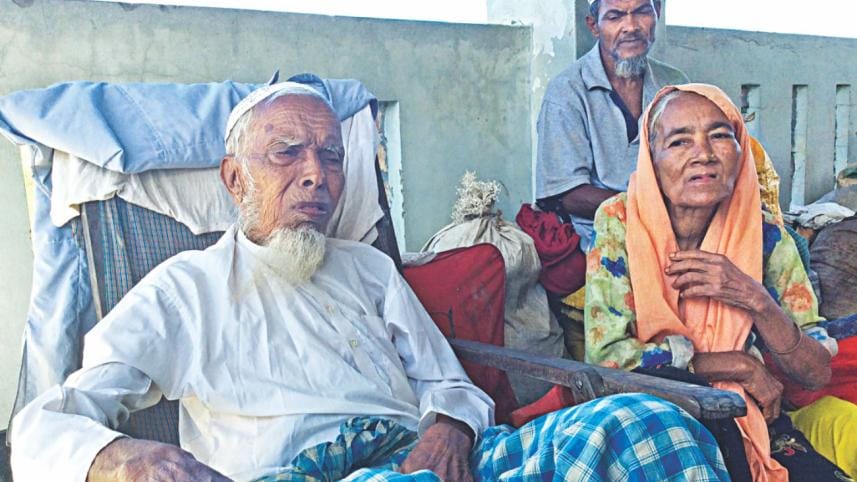Same chair, but worlds apart

Samir Uddin, who rushed to help the distressed throughout his life, has now grown so old that he can't even move on his own. Until recently, he used to sit on his favourite wooden easy chair at a corner of his homeyard in Rakhine the entire day. Passers-by would stop and greet him out of respect.
These days, the Rohingya man still sits on the same chair, but the place is not the same. For him, it is an unknown place with almost no familiar faces.
Although the violence broke out in Rakhine on August 25, Samir and his family moved to Bangladesh last week. They tried their best to stay there in vain.
Leaving a bungalow, 15 acres of land and several cattle behind, the family along with 200 other refugees from different villages of Rakhine has taken shelter at Hazi Md Hossain Government Primary School near Lambabil area. As Samir cannot walk, his grandsons carried him along with the easy chair to Teknaf.
"I never imagined that I would ever have to leave my village this way," said an emotional Samir who was accompanied by his elder son Abdul Habib, aged over 70 years, and one of his daughters, Bilkis, 65.
Though Samir is now around 100, he still remembers a lot about the past. Clad in a white panjabi and a lungi, which became quite dirty over the days, he recalled some of his memories.
"I gave shelter to some refugees from Bangladesh during the 1971 Liberation War. A few Bengali families lived in my house for months," he said sitting on the easy chair at the school.
Later in 1978, Samir fled to Bangladesh along with his family members during an army crackdown on the Rohingyas in Myanmar.
"During that time, we stayed at Arzumanpara [in Teknaf] for days. I thought I got shelter because I gave shelter to someone in the past. I thought the equation was over. But I have come here once again."
Samir said he did not want to stay here as a refugee for long.
His son Abdul said their home was in Aischor village, around eight kilometres off the banks of the Naf river.
"My sons used to cultivate rice in a few acres of land. We had plenty of food at home. My father even used to donate money to the poor and local mosques," he said, adding now his family depends entirely on relief to survive.
"One Abdul Zalil and his family from Maheshkaliapara
had taken shelter in our home in 1971. Zalil is dead and we are looking for his sons," said Abdul.
Zafar Alam Chowdhury, former president of Teknaf Upazila Awami League, lives a few hundred yards from the Hazi Md Hossain Government Primary School.
Asked, he said he himself along with his family took shelter in Arakan during the war in 1971.
"Nearly one lakh people from Teknaf took refuge in different villages in Arakan. I stayed in a village called Guruterbil near Bolibazar," said Zafar, 82.
Nibedita Bhattachariya, headmistress of the school, said nearly 300 people from Myanmar came and started staying at the institution a few days ago.
"We are facing difficulties in running our regular academic activities. But still, I don't know how to tell the Rohingyas to leave. Where would they go?" she asked.

 For all latest news, follow The Daily Star's Google News channel.
For all latest news, follow The Daily Star's Google News channel.
Comments